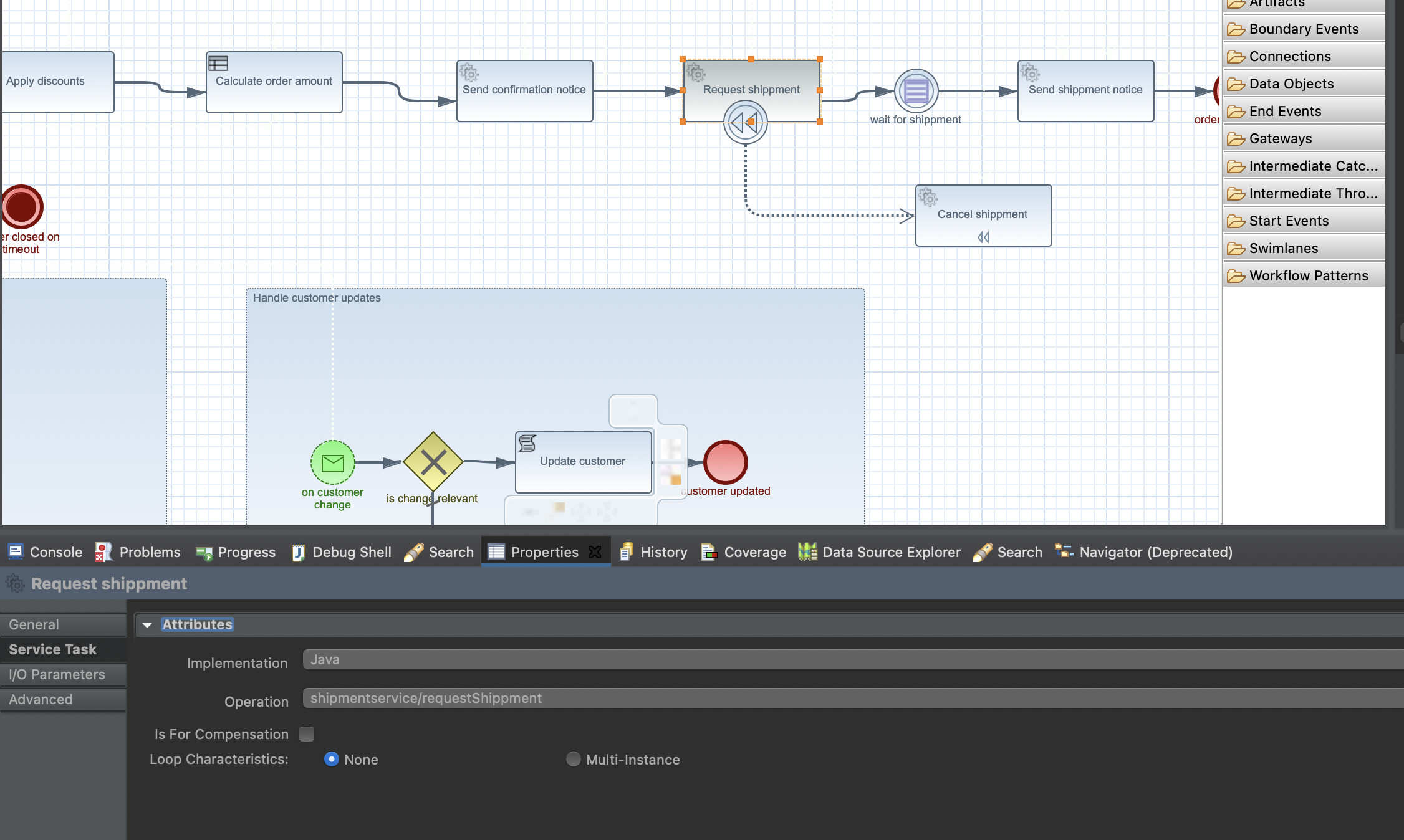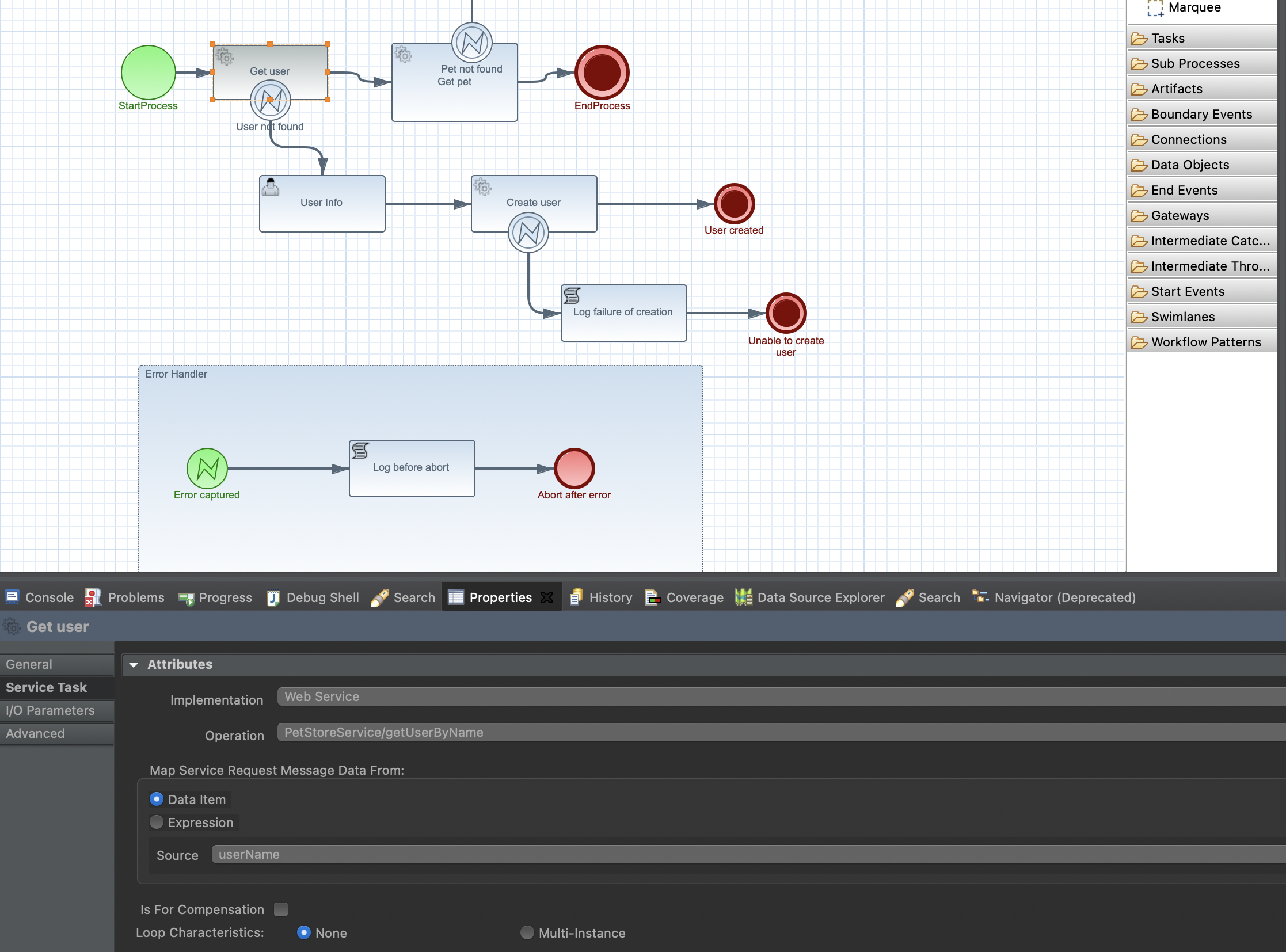Service invocation
One of the most common tasks in workflows is service task. This task is responsible for invoking an operation. There might be various types of operations such as
-
java method in one of the service classes of the project itself
-
ReST call to remote service
These operations are configured as a service tasks and invoked by the workflow engine.
Service tasks can also be equipped with error handling by the use of boundary events, see details here.
Invoking local service
Services can be implemented as part of the project itself. That means they reside in the same code base and usually are represented as CDI bean that enables additional dependent services and/or classes to be automatically injected.
As an example, one can fetch information from the data base and thus the service responsible for connecting to a data base will need to get hold of data source to be able to obtain connections.
@ApplicationScoped
public class PersonDataLoader {
@Inject
DataSource dataSource;
public List<Person> load() {
// implementation of the loading logic
}
}On the workflow side, such service is declared as interface where there are following information required
-
Interface name - that will be used to reference it from service tasks
-
Interface implementation - fully classified class name
-
Operations - list of operation names that match the method names of the service class
These are declared on the workflow level, via properties panel.

Once interfaces and their operations are defined, service tasks can reference them.

Lastly service operations can require inputs and might produce outputs. These
can be mapped to and from workflow instance variables via IO parameters of
the service task

Where
-
Input Data Mapping corresponds to operation arguments
-
Output Data Mapping corresponds to returned value from the operation
This is all that it takes to invoke a local service operation from within workflow.
Asynchronous service invocation
Sometimes there might be a service call that might take more time and thus shall be invoked asynchronously. Or it simply blocks on IO and thus can be inefficient to block threads and thus become a bottleneck in the service as a whole.
To address that, service implementation can be made reactive and thus follow the continuation pattern. In other words this will release the thread whenever it is about to block and schedule IO operation to continue as soon as it produces results.
The implementation is based on SmallRye Mutiny that implements efficient layer for reactive programming.
@ApplicationScoped
public class PersonDataLoader {
@Inject
DataSource dataSource;
public Uni<List<Person>> load() {
// implementation of the loading logic
}
}As can be noted, the only thing here is the return type that returns Uni (a reactive type of Mutiny)
and based on that information, workflow engine will apply the continuation pattern freeing the thread and the workflow instance
from being blocked.
There is no need to make any modifications on the workflow definition to make use of asynchronous invocation.
Invoking REST service
As opposed to local services, workflows in many cases need to interact with outside world. Especially common when implementing orchestration based service where coordination of various external systems is a key.
To make this possible, service tasks allow to invoke ReST services based on OpenAPI service description.
Main part required for this use case is the OpenAPI service description that is either locally
(inside the project’s resource folder src/main/resources) or remotely (accessible over the http(s) protocol).
On the workflow side, such service is declared as interface where there are following information required
-
Interface name - that will be used to reference it from service tasks
-
Interface implementation - location of the OpenAPI service description (
/api/swagger-petstore.jsonorhttps://petstore.swagger.io/v2/swagger.json) -
Operations - list of operations that match the
operationIdfrom OpenAPI service description
These are declared on the workflow level, via properties panel.

Once interfaces and their operations are defined, service tasks can reference them.

Note that ReST service when being referenced needs to select the webservice as implementation
|
Lastly service operations can require inputs and might produce outputs. These
can be mapped to and from workflow instance variables via IO parameters of
the service task

Where
-
Input Data Mapping corresponds to operation arguments
-
Output Data Mapping corresponds to returned value from the operation
This is all that it takes to invoke a ReST service operation from within workflow.
Asynchronous service invocation
Similar to local service calls, ReST service invocation can also be made asynchronous. Here it is even more important as going to remote ReST service over the network is certainly a blocking operation with no clear information how fast or how slow it can be.
To make the ReST operation asynchronous, workflow definition must declare that on the interface operation level
as additional parameter on top of the operation name e.g. createUser?mode=async

And this is the only required change to make the service run in asynchronous manner.